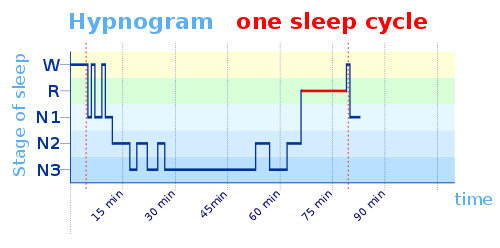Sleep Broken Down to Its Most Fundamental Level
Episode #2 of the course Sleep hacks: Using science to improve your sleep by John Robin
Welcome back!
Today’s hack is aimed at understanding just what sleep is and why it’s important.
If you’re going to commit to spending ⅓ of your life in bed sleeping, then the path to embracing this lies first in appreciating why what you do during this time is as important as what you do in the other ⅔ of your life when you’re awake.
Sleep Cycles
On the broadest level, we can think of sleep as a series of approximately 90- to 120-minute cycles that ensue shortly after we lie down. These cycles repeat throughout the night.
You can think of each cycle as having a peak and a trough, like in this diagram:

In the diagram:
• W = waking
• R = REM sleep
• N1 = Non-REM Stage 1
• N2 = Non-REM Stage 2
• N3 = Non-REM Stage 3
The sense of “depth” in the diagram relates to how conscious we are.
When we are lying down, breathing deeply, and preparing to sleep, we are in the waking state, the most conscious. Sinking downward in the diagram corresponds to being less conscious, where N3 is the deepest unconscious state.
Notice also that in falling asleep, you skip past REM and enter the first stage of Non-REM sleep, N1. REM stands for “rapid eye movement,” after this particular kind of eye movement was first described during this stage of sleep by Professor Nathaniel Kleitman in 1953. We’ll come back to REM sleep in a moment.
There are three stages of deeper sleep than REM, and when we jump to Stage 1 directly from waking, we pass through them in descending order at the start of a sleep cycle:
• Stage 1, exhibiting slow eye movements, called “restful wakening,” since people roused from this state believe that they haven’t been sleeping. Occasionally, you will experience a hypnic jerk (if you’ve ever started falling asleep in a class or meeting, then startled yourself awake, that’s what this is).
• Stage 2, exhibiting no eye movement at all, but still easy to be awakened from. During this time, EEGs show brief bursts of high-frequency brain activity in the thalamus, called sleep spindles, which are believed to be part of long-term memory consolidation.
• Stage 3, called “slow-wave sleep”, or SWS for short, from which it is the most difficult to be awakened. During this time, the brain exhibits the slowest of all delta waves (1-4 Hz). Contrary to popular belief, you can dream during this stage, though they are typically less vivid and less memorable. (Fun fact: People who practice sleep yoga, or Yoga Nidra, can remain conscious while in this stage of sleep.)
After spending time in the deepest SWS sleep stage, the cycle moves in reverse, with one exception: After returning to Stage 1, instead of awakening, you stop at REM sleep.
During REM, you tend to have your most vivid dreams. Your body is paralyzed but your mind is fully awake. We typically awaken while in this stage, which is why we tend to remember dreams from REM (vs dreams during NREM in Stage 3). What happens during REM is extremely important and often overlooked, which is why it will be the topic of tomorrow’s hack.
During a full night’s sleep, you go through this full cycle about four to five times. As the night progresses, you spend less time in the first part of the cycle and more time in REM sleep.
Without the Non-REM sleep that you get mostly in the first three cycles of sleep, you’ll die. But even without the full REM sleep that you get by putting in your four to five cycles a night, you deteriorate in different ways, most of which are invisible in the short term.
This is why getting more than six hours is crucial: Though you get your critical sleep early in the night, you get your REM sleep later.
Why is REM sleep so important?
That’s for tomorrow!
Your main takeaway from today’s hack is to apply your knowledge of how sleep works to understanding why you need those eight-plus hours. Further work in this course will help you unpack the attitudes and habits that get in the way of this, once more using science as our tool to hack the best quality sleep for the maximally productive life.
Recommended book
The Sleep Revolution by Arianna Huffington
Share with friends

